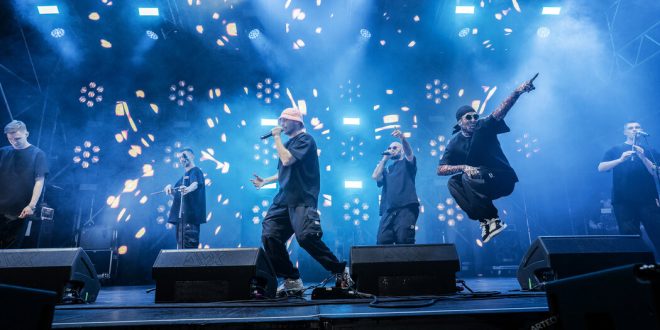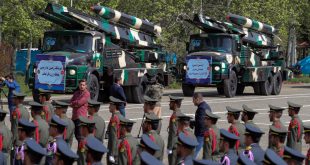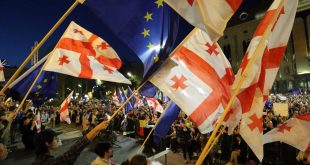For 11 weeks, Ukrainians have been braving war, destruction and loss. But on Saturday, they could be celebrating victory: The country’s rousing, hip-hop infused song “Stefania” is favored to win the Eurovision Song Contest, the cultural phenomenon that helped launch Abba and Celine Dion and is watched annually by 200 million people.
“Stefania,” an anthemic song from Ukraine’s Kalush Orchestra, was originally written to honor the mother of the group’s frontman, Oleh Psiuk. But since the war, it has been reinterpreted as a tribute to Ukraine as a motherland. The song includes lyrics that roughly translate to, “You can’t take my willpower from me, as I got it from her,” and “I’ll always find my way home, even if the roads are destroyed.”
The wildly popular Eurovision Song Contest, a famously over-the-top display of kitsch, whose past winners include a Finnish heavy metal monster band fond of blowing up smoking slabs of meat onstage, has taken on particularly political overtones this year.
In February, the event’s organizers banned Russia from participating in the contest, a showcase meant to promote European unity and cultural exchange, citing fears that Russia’s inclusion would damage its reputation.
The move underlined Russia’s intensifying estrangement from the international community, including in the realm of culture. Russia began competing in the song contest, the world’s largest, in 1994, and has competed more than 20 times. Its participation has been a cultural touchstone of sorts for the country’s rebound and engagement with the world after President Vladimir V. Putin of Russia came to power in the wake of the political and economic chaos of the 1990s.
In 2008, when Dima Bilan, a Russian pop star, won Eurovision with the song “Believe,” Mr. Putin weighed in promptly with congratulations, thanking him for further burnishing Russia’s image.
It is not the first time that politics have encroached on the contest, which premiered in 1956. In 2005, Ukraine’s entry song was rewritten after being deemed too political because it celebrated the Orange Revolution. When Dana International, an Israeli transgender woman, won in 1998 with her hit song “Diva,” rabbis accused her of flouting the values of the Jewish state.
Several bookmakers have said that Ukraine is by far the presumptive favorite to win the competition this year. Winners are dete rmined based on votes from national juries and viewers at home.
Ukraine’s entry “Stefania” comes from a band that blends traditional Ukrainian folk music with rap and hip-hop. Kalush Orchestra brought the semifinal audience in Turin, Italy, to its feet on Tuesday with a spirited performance that sent them through to Saturday’s Grand Final.
The band traveled for Eurovision with special permission to bypass a martial law preventing most Ukrainian men from leaving the country, according to the Ukrainian public broadcasting company Suspilne.
War has necessitated other adjustments. The Ukrainian commentator for the show, Timur Miroshnychenko, has been broadcasting from a bomb shelter.
A photo posted by Suspilne showed the veteran presenter at a desk in a bunkerlike room, surrounded by computers, wires, a camera and eroding walls that revealed patches of brick underneath. It was not clear what city he was in.
The bunker had been prepared to prevent disruptions from air raid sirens, Mr. Miroshnychenko told BBC Radio 5 Live. He said Ukrainians love the contest and were “trying to catch any peaceful moment” they could.
“Nothing is going to interrupt the broadcast of Eurovision,” he said.
 Top Naija News: Nigerian News, Breaking News Nigeria and World News Top Naija News is a daily news publication in Nigeria, delivering the latest breaking news in Nigeria and around the world.
Top Naija News: Nigerian News, Breaking News Nigeria and World News Top Naija News is a daily news publication in Nigeria, delivering the latest breaking news in Nigeria and around the world.




